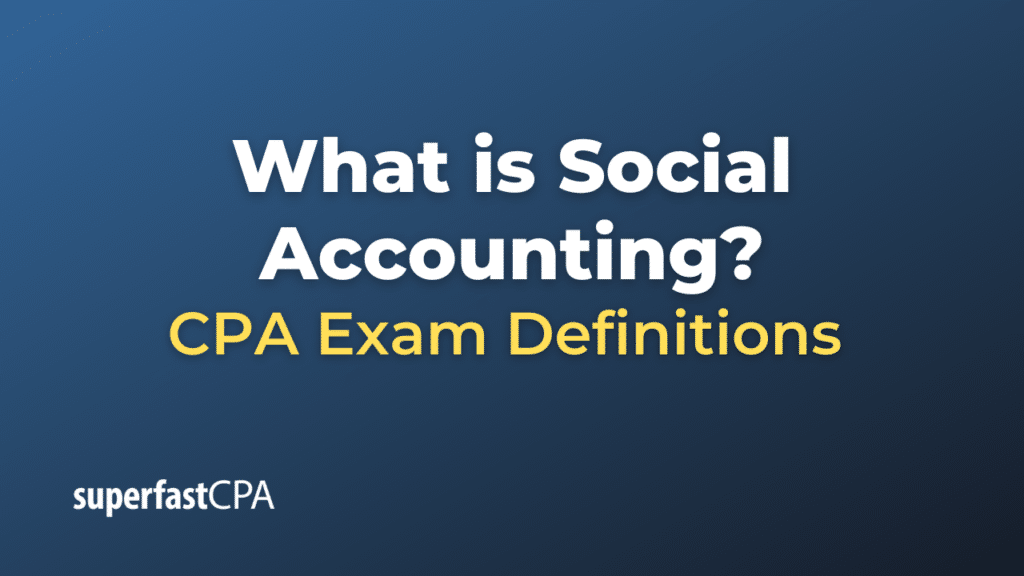Social Accounting
Social accounting, often associated with the broader term “corporate social responsibility” (CSR), refers to the process of reporting and measuring the social and environmental effects of an organization’s activities. It is a way for companies to provide a comprehensive view of their performance, beyond just financial metrics, and demonstrate their commitment to ethical, environmental, and societal values.
Social accounting can be seen as an attempt to provide a more holistic view of a company’s activities, encompassing its impact on all stakeholders, including employees, the community, the environment, and even the broader society.
Key aspects of social accounting include:
- Transparency: Companies are open about their activities, both positive and negative, providing a clearer picture of their overall performance.
- Stakeholder Engagement : Social accounting often involves input from various stakeholders. This can help organizations understand the different perspectives and concerns related to their operations.
- Performance Measurement: It’s not just about reporting but also about measuring. Companies set targets for social and environmental performance and then measure their progress against these benchmarks.
- Broader Impact Analysis: Beyond financial results, companies look at the wider impacts of their activities, including environmental sustainability, employment practices, community engagement, and more.
- Continuous Improvement: The process of social accounting can highlight areas where companies can improve their social and environmental performance. By setting new targets and strategies, businesses can continually enhance their CSR efforts.
Example of Social Accounting
Let’s illustrate the concept of social accounting with a fictional example.
BrightSolar Ltd. is a company that manufactures solar panels and promotes renewable energy solutions. At the end of the financial year, apart from their financial statements, they decide to release a “Social Impact Report” for their stakeholders.
1. Environmental Impact:
- Carbon Footprint Reduction: BrightSolar installed solar solutions in 2,000 homes over the year, reducing carbon emissions by an estimated 10,000 tons annually.
- Recycling Initiatives: The company started a recycling program for old solar panels, ensuring that 90% of the materials were reclaimed and reused.
- Water Conservation: Implemented a water-saving system in their manufacturing unit, reducing water consumption by 40%.
2. Social Impact:
- Employee Welfare: Introduced a health and wellness program, leading to a 20% reduction in sick days and an increase in overall employee satisfaction.
- Community Engagement: Launched a program where employees volunteered at local schools to educate children about renewable energy. Over 1,000 students were reached.
- Fair Employment: BrightSolar ensures equal pay for equal work and has achieved a 50:50 gender balance in managerial positions.
3. Economic Impact:
- Local Job Creation: BrightSolar opened a new manufacturing facility, creating 150 jobs in a region with previously high unemployment.
- Support for Local Businesses: The company sourced 70% of its raw materials from local suppliers, pumping money back into the local economy.
4. Stakeholder Feedback:
BrightSolar conducted surveys and feedback sessions with local communities, customers, and employees. Key feedback included:
- Local Community: Positive feedback on job creation but concerns about transport disruptions due to increased truck movements.
- Customers: High satisfaction with the product but requests for a more extended warranty period.
- Employees: Satisfaction with the wellness program but requests for more flexible working hours.
By the end of the report, BrightSolar sets new targets based on the feedback received and the areas where they feel more progress is required. This report serves as a commitment to their stakeholders and the broader community about their social responsibilities.
This example showcases how social accounting is more than just numbers – it’s a narrative of the broader impacts a company has on society and how it responds to stakeholder concerns.













